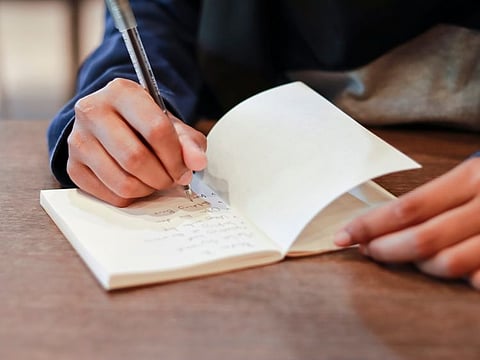Writing down our expenditures
The simple act of noting it all down will make us realise how little we need

Have you noticed how simple practices sound so much better when we use a foreign name for them? Take for example the Japanese word “Kakeibo” that appeared a couple of weeks ago in our newspapers.
It means “the art of manual budgeting” — and essentially you pick up a pen and paper and write down what you spend on a regular basis.
Sometimes I try to write down accounts when we go out of the country and have limited foreign currency with us, but my resolve fizzles out fast and in no time at all I am back to relying on quick mental imaging of the local stores to decide whether I can get the same things back home at a lower cost — or whether I need it at all
Of course, it also implies that you correlate your income and expenditure, give thought to what you need and what you want and pause before splurging — unlike so many of us who swipe without a thought and often find we have months to go before we finish paying for what was “a wonderful deal”, “a great offer”, “a huge bargain”.
Meticulous about keeping accounts
We had a pretty good example set for us as both our parents regularly wrote down what they spent. Father was more meticulous about keeping accounts and made sure he had his expenditure diary at hand at all times.
Thus, he could tell us at any given moment what a tube of toothpaste or a bar of chocolate cost from the 1940s, before he became a father, to the 2000s when he was a great-grandfather.
Also Read: When friends become strangers
Also Read: Make health a priority now
Also Read: Do we actually re-read books?
Naturally, as youngsters, we didn’t want to hear these prices. To our way of thinking, toothpaste had to be bought anyway and knowing that the price had shot up didn’t make us less inclined to use it.
As for that bar of chocolate, we didn’t like to be reminded that it was a luxury to be shared by all and we either sulked over the implication that we were being indulged and refused the treat or we shut our ears and gulped it down.
For all that he was so painstaking about writing down accounts, Father did not really bother to make sure that he lived within his means.
He often splurged and filled the refrigerator with goodies from places he visited on official duty and he didn’t believe in accumulating money for the rainy days that could come up in future.
Rainy day emergency
It was left to Mother to do that — and no matter how little she had in hand to manage the household, she could always be relied upon to have those “rainy day” emergency amounts that were required by kids, pets and the many guests who took her loaded table for granted.
How she did this we could never figure out — and when it was my turn to manage my family finances, I did not even bother to try.
I just attempted to make sure we didn’t spend before we had earned and we didn’t try to keep up with the local equivalents of the Joneses by hankering for things that were beyond our means.
Quick mental maths
Sometimes I try to write down accounts when we go out of the country and have limited foreign currency with us, but my resolve fizzles out fast and in no time at all I am back to relying on quick mental imaging of the local stores in India to decide whether I can get the same things back home at a lower cost — or whether I need it at all.
Also, a cap on costs (“I will not buy it if it is over ___ dollars/Euros/dirhams”), and good old-fashioned turning away from eye-catching trinkets and mementoes generally works for me and I usually return without regrets and without a mad scramble to go out and earn enough to justify what has been spent.
Now however, with a question mark over income for so many of us in the future, perhaps it would be a good idea to pick up a pen and paper and work on our personal income and expenditure statements.
Who knows? Maybe that simple act of noting it all down will make us realise how little we need, how lucky we are to have what we do — and we can then reach out to others in need.
—Cheryl Rao is a journalist based in India


